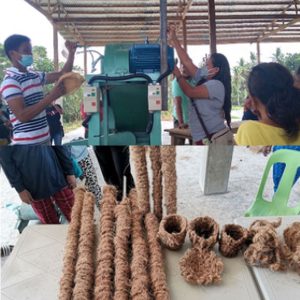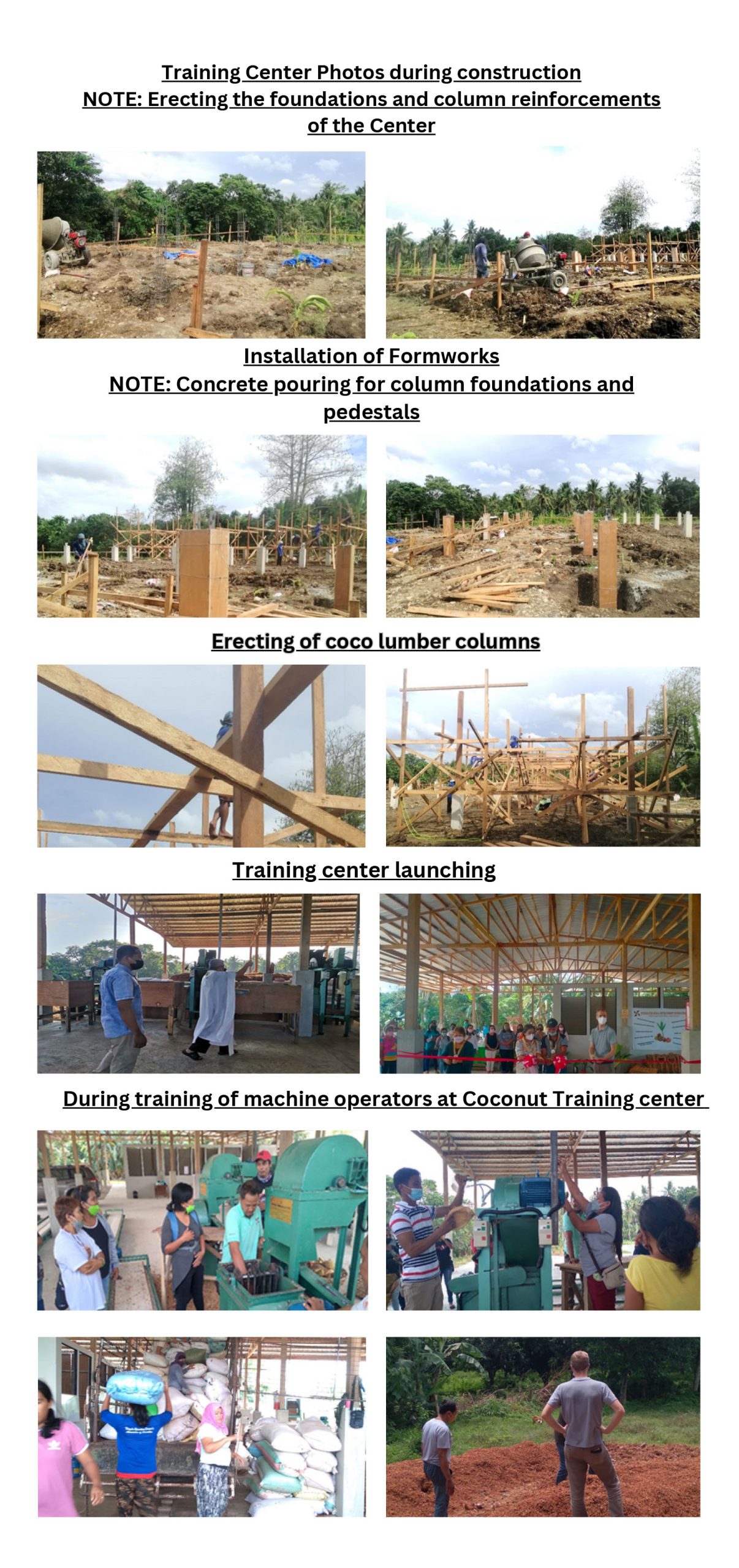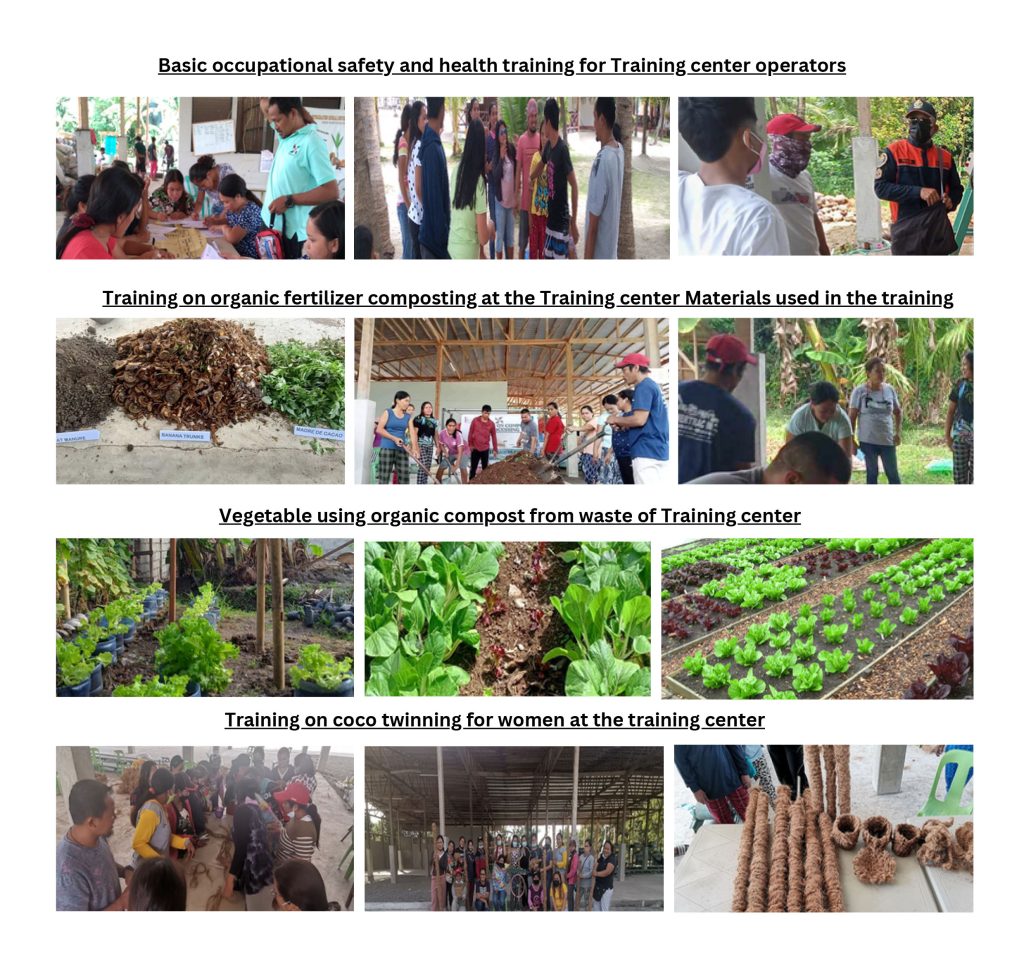Another busy day at the Coconut Training Center
Tamlangon is a barangay in Davao del Sur, in the municipality of Matanao (17,000 households in 2020). Most areas are planted with rice, bananas, coconut and various fruit trees. Residents of Tamlangon mostly engage in farm work. Outside of planting and harvesting, they have no other sources of extra income. Until the BIOGROW Philippines, a substrate company based in Mindanao and the Integrated Rural Development Foundation (IRDF) under its DMDP project constructed the Coconut Training Center (COCO- TRACE).

Before the Center was set up, it was planted to banana and corn. Its owner, a retired military man, had a caretaker to attend to his farm. (He lived in Padada, over 20 kilometers away from Tamlangon, Matanao.) The place had little if nothing to offer to the community.
Today is different
The Coconut Training Center was built in 2021 as part of the IRDF-Biogrow project entitled “Promoting inclusive economic growth through valorisation of coconut husks.” It took seven months to build; finally in January 2022 it began operating as a training and demonstration center. With three chipping machines and a husk separator, a small office and cemented area for training, drying and storage of chips, the Training Center soon became a hub for coco husk chip processing in the area.
Now it’s noisy and dusty. People come and go. Trucks come and go. Husks pour in, chips fly out in wing vans. The residents are acquiring new skills. Jobs are created in addition to the seasonal farm work of planting and harvesting. Women with spare time (unfortunately they still have to do unpaid work at home and provisioning for their children) come to the Training Center to earn extra.
Nearby, food services have emerged, with enterprising cooks taking advantage of the income opportunities provided by the Training Center. Farmers can sometimes be seen on the side of the road of the Center, dehusking their whole nuts to sell to the Center. The Center is in talks with the administrators of nearby public schools for the faculty, students and their parents to plant vegetable gardens in the school premises using organic waste from the Training Center.
It seems life can only get better
At last count, there are 35 farming families benefiting from the Training Center. Because of the new learning and new earnings from the Training Center, the families are able to send their children to school. Some have been able to save enough money to raise livestock.
Mr. Jose Bobong Taborada and his family work in the Training Center drying chips. Prior to the Coconut Training Center’s establishment, he worked in a coconut farm as a laborer
But because such employment was available only during harvest time, Bobong found it hard to sustain his family’s needs. He was very thankful for the DMDP project; he has been able to send his daughter to college with a Bachelor’s Degree in Elementary Education. His dream to see his daughter become a teacher is now within arm’s reach.
Ms. Elvie Santiago has become a highly skilled chipping machine operator from the time she joined the Training Center in January 2022. Recently widowed, she is able to send her daughter to college with her earnings as a chipping operator. As a single parent, she struggles to balance her household budget. So she works hard at the Training Center so that she can sustain her family’s daily needs.
Most of the beneficiaries at the Coconut Training Center are women. Before the Center appeared in their lives, they were mostly at home, with little if no income of their own.
The Training Center has provided a meeting place for the women of Tamlangon, Matanao, to generate new incomes, and to encourage and support each other. Surrounded by a circle of supportive female companions, they find themselves with an associated network that truly understands the unique challenges each of them faces—thereby helping them overcome the daily grind of rural life together.






